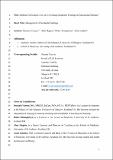Medical curriculum : how do we manage incidental findings in educational settings?
Abstract
Medical curricula encompass two practical-based teaching categories with likelihood of identifying incidental findings (unexpected and previously undiagnosed findings with potential health implications) in live models for demonstration purposes. One relates to clinical skills involving peers and simulated or volunteer patients. The other involves laboratory sessions, with live models, for the purposes of demonstrating scientific principles. As educationalists, it is our professional and ethical duty to have guidance on how to manage incidental findings. In this commentary, we have outlined our best practice guidelines formalised as a written policy exploring consent, debriefing, and the teachers’ role. Our aim was to develop an ‘easy-to-follow’ standardised mechanism.
Citation
Varsou , O , Hughes , A , Humphreys , R A & Laidlaw , A H 2021 , ' Medical curriculum : how do we manage incidental findings in educational settings? ' , Medical Science Educator , vol. 31 , no. 2 , pp. 893 - 895 . https://doi.org/10.1007/s40670-021-01211-3
Publication
Medical Science Educator
Status
Peer reviewed
ISSN
2156-8650Type
Journal item
Collections
Items in the St Andrews Research Repository are protected by copyright, with all rights reserved, unless otherwise indicated.

